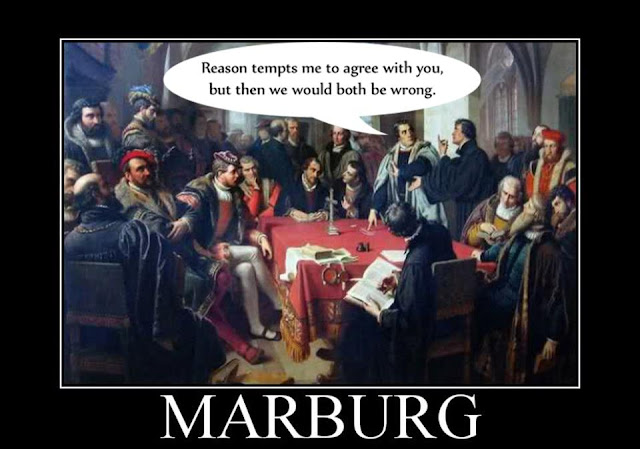Did the Whole Church Get the Eucharist Wrong before the 16th Century?
For we do not receive these things as common bread or common drink; but just as our Savior Jesus Christ, being incarnate through the work of God, took flesh and blood for our salvation, so too we have been taught that the food over which thanks have been given by a prayer of the Word that is from Him, from which our flesh and blood are fed by transformation, is both the flesh and blood of that incarnate Jesus. (Justin Martyr, First Apology 66:2)
I ran across this statement from Justin Martyr in the 3rd Century, and it occured to me that in all of my reading of primary sources throughout church history, I can’t find a single person who regards the elements of the Lord’s Supper to be merely a memorial or a symbol prior to the 16th century who isn’t also a heretic for other reasonsIn fact, one can hardly find any heretics that held a memorial/symbolic view.If it is in fact true that the memorial view wasn’t held by any otherwise-orthodox believer prior to the sixteenth century, what does this say about the validity of this view if no one in the church holds to it for fifteen hundred years of the church’s history? Was the whole church wrong until Zwingli? I suppose many Evangelicals will bite the bullet and say ‘yes’, but that’s an awfully big bullet. Let me head off at the pass the argument that the Roman Catholic church is to blame for this doctrine. I’m sorry to take away that old saw from the Evangelicals, but the confession of the substantial presence was in the Eastern church as much as it was in the Western church. Long before the Magisterium in the West, the church throughout the world held to this doctrine. The above quote from Justin Martyr, while one of the earliest, is just one of many pre-Nicene statements identifying the Eucharist as the body and blood of Christ.
Ultimately, to hold a memorial/symbolic view is to disconnect yourself from the church throughout time. Whenever you have universal agreement or even nearly universal agreement by the church throughout the ages, to go on insisting that the whole church is wrong and that you are right is a dangerous and arrogant move. Lest anyone think that this statement entails the infallibility of the church or that it leads to Rome, consider that the Roman church has no problem with novelty and going against what the church throughout the ages has taught and practiced. Lutheran theology passes the novelty test. Justification by faith alone, for example, (even if in nascent form) can be found much earlier than Luther.
This article is by Pastor John Fraiser. It was originally posted at Steadfast Lutherans, but is posted here with Pastor Fraiser's permission.
To join in the conversation on Facebook, CLICK HERE.


Comments